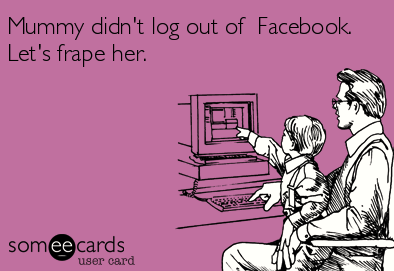Steven Levine writes me about coming across the portmanteau frape on a recent visit to Ireland, heard from young Irish acquaintances:
It refers to somebody getting hold of your Facebook access (I’m assuming because they all log in from their phones so this is easy enough for a friend to do, if you leave your phone sitting on a table or somethiing) and posting as you. (A fake post is a “frape”, and somebody might have a status saying “fraped again”.) It stands for “Facebook rape”.
At first, Steven didn’t know whether the usage was specifically Irish or specifically youth-speak (or both), but he’s since discovered that it’s widespread. There’s even a snarky e-card:
Google on {“frape” “Facebook”} and look at the images — many many screenshots of frapes.
There’s an Urban Dictionary page for frape, with a first entry from June 2007. The word came up on ADS-L back in 2004, but not in its current sense. From Larry Horn on 12/30/04:
Below you will find the second annual compilation of selected (by me) entries from students’ NEWJs (New English Word Journals), collected during the course of the past semester and submitted as one of the assignments for the Yale undergraduate course in the Structure and History of English Words.
… frape, v. ‘to make overly strong and/or unwelcome attempts at friendship’
Not long after it began to appear in its current sense. (I should remind you that Facebook began early in 2004.)
Frape incorporates a rape metaphor, and many have objected to the metaphor in general. A characteristic posting, by Chloe Angyal on HuffPo (“More Than Words: The Rape Metaphor” of 1/11/10):
… the young men [at the University of Sydney] … insisted that they had used the word “rape” metaphorically, to describe the defeat of a rival football team by their own. And they were probably telling the truth; among Australian college students, “rape” is often used to describe particularly unpleasant experiences. Certainly, it is a part of the vernacular of St. Paul’s, the residential college to which the young men in question belonged. The day after the article first appeared in the Sydney Morning Herald, one member of the Facebook group expressed his feelings about it using his Facebook status: “Paul’s was raped by the SMH.”
It’s not only in Australia that “rape” is used as a metaphor for an unpleasant experience. Here in the US, it is not uncommon to hear the word invoked to describe a particularly grueling exam or an especially hard day at work. Indeed, Media Matters has compiled a rather disturbing montage of clips of conservative media commentators, most notably Glenn Beck and Rush Limbaugh, repeatedly using the word as a metaphor for anything and everything bad.
There’s nothing wrong with metaphors, of course, and as I’m sure they’d be swift to point out, Limbaugh and Beck are well within their rights to use any words they please to express their feelings about taxation, bailouts and illegal immigration. But using the word to describe a garden variety bad experience trivializes the very real experience of rape victims. And the sad truth is that our culture already trivializes rape enough without the contributions of Fox news commentators or Australian frat boys.
It’s a complicated matter. Sexual and violent metaphors are natural for describing competitions, dominance, and undergoing bad experiences:
The Tigers totally destroyed / annihilated / screwed / fucked the Panthers.
What an awful test; I’m totally destroyed / screwed / fucked.
The rape metaphor is especially suited to the Facebook case, where the affected person is violated against their will.
It would be hard to tolerate the other violent and sexual metaphors while barring only the rape metaphor. The other violent metaphors glorify violence, and the other sexual metaphors incorporate negative views of sex, and you might reasonably object to them on those grounds, but I can’t see purging these metaphors from language use. In addition, many of these metaphors have become conventionalized to one degree or another, so that the literal senses of the lexical items are at least muted, if not entirely below the level of consciousness.
So you can agree that our culture trivializes rape but still not see every use of the word rape as literal (and trivializing of the experience of being raped).

